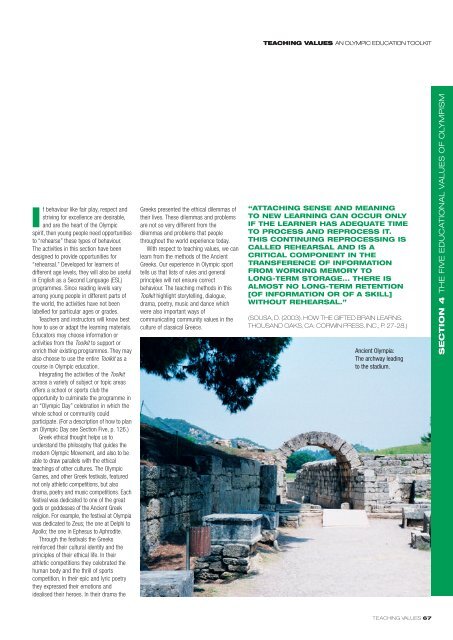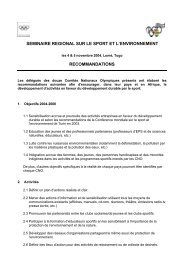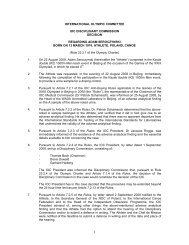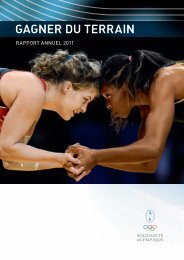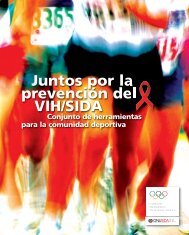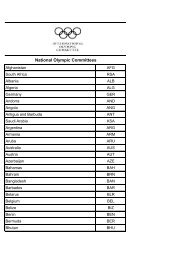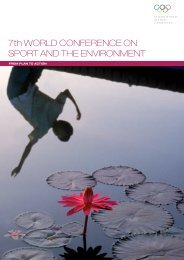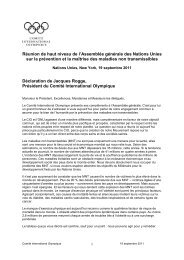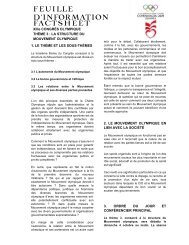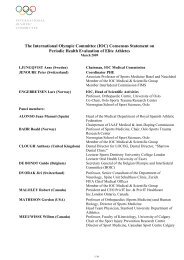Teaching Values- An Olympic Education Toolkit - International ...
Teaching Values- An Olympic Education Toolkit - International ...
Teaching Values- An Olympic Education Toolkit - International ...
You also want an ePaper? Increase the reach of your titles
YUMPU automatically turns print PDFs into web optimized ePapers that Google loves.
TEACHING VALUES AN OLYMPIC EDUCATION TOOLKIT<br />
If behaviour like fair play, respect and<br />
striving for excellence are desirable,<br />
and are the heart of the <strong>Olympic</strong><br />
spirit, then young people need opportunities<br />
to “rehearse” these types of behaviour.<br />
The activities in this section have been<br />
designed to provide opportunities for<br />
“rehearsal.” Developed for learners of<br />
different age levels, they will also be useful<br />
in English as a Second Language (ESL)<br />
programmes. Since reading levels vary<br />
among young people in different parts of<br />
the world, the activities have not been<br />
labelled for particular ages or grades.<br />
Teachers and instructors will know best<br />
how to use or adapt the learning materials.<br />
Educators may choose information or<br />
activities from the <strong>Toolkit</strong> to support or<br />
enrich their existing programmes. They may<br />
also choose to use the entire <strong>Toolkit</strong> as a<br />
course in <strong>Olympic</strong> education.<br />
Integrating the activities of the <strong>Toolkit</strong><br />
across a variety of subject or topic areas<br />
offers a school or sports club the<br />
opportunity to culminate the programme in<br />
an “<strong>Olympic</strong> Day” celebration in which the<br />
whole school or community could<br />
participate. (For a description of how to plan<br />
an <strong>Olympic</strong> Day see Section Five, p. 126.)<br />
Greek ethical thought helps us to<br />
understand the philosophy that guides the<br />
modern <strong>Olympic</strong> Movement, and also to be<br />
able to draw parallels with the ethical<br />
teachings of other cultures. The <strong>Olympic</strong><br />
Games, and other Greek festivals, featured<br />
not only athletic competitions, but also<br />
drama, poetry and music competitions. Each<br />
festival was dedicated to one of the great<br />
gods or goddesses of the <strong>An</strong>cient Greek<br />
religion. For example, the festival at Olympia<br />
was dedicated to Zeus; the one at Delphi to<br />
Apollo; the one in Ephesus to Aphrodite.<br />
Through the festivals the Greeks<br />
reinforced their cultural identity and the<br />
principles of their ethical life. In their<br />
athletic competitions they celebrated the<br />
human body and the thrill of sports<br />
competition. In their epic and lyric poetry<br />
they expressed their emotions and<br />
idealised their heroes. In their drama the<br />
Greeks presented the ethical dilemmas of<br />
their lives. These dilemmas and problems<br />
are not so very different from the<br />
dilemmas and problems that people<br />
throughout the world experience today.<br />
With respect to teaching values, we can<br />
learn from the methods of the <strong>An</strong>cient<br />
Greeks. Our experience in <strong>Olympic</strong> sport<br />
tells us that lists of rules and general<br />
principles will not ensure correct<br />
behaviour. The teaching methods in this<br />
<strong>Toolkit</strong> highlight storytelling, dialogue,<br />
drama, poetry, music and dance which<br />
were also important ways of<br />
communicating community values in the<br />
culture of classical Greece.<br />
“ATTACHING SENSE AND MEANING<br />
TO NEW LEARNING CAN OCCUR ONLY<br />
IF THE LEARNER HAS ADEQUATE TIME<br />
TO PROCESS AND REPROCESS IT.<br />
THIS CONTINUING REPROCESSING IS<br />
CALLED REHEARSAL AND IS A<br />
CRITICAL COMPONENT IN THE<br />
TRANSFERENCE OF INFORMATION<br />
FROM WORKING MEMORY TO<br />
LONG-TERM STORAGE... THERE IS<br />
ALMOST NO LONG-TERM RETENTION<br />
[OF INFORMATION OR OF A SKILL]<br />
WITHOUT REHEARSAL.”<br />
(SOUSA, D. (2003). HOW THE GIFTED BRAIN LEARNS.<br />
THOUSAND OAKS, CA: CORWIN PRESS, INC., P. 27-28.)<br />
<strong>An</strong>cient Olympia:<br />
The archway leading<br />
to the stadium.<br />
SECTION 4 THE FIVE EDUCATIONAL VALUES OF OLYMPISM<br />
TEACHING VALUES 67


